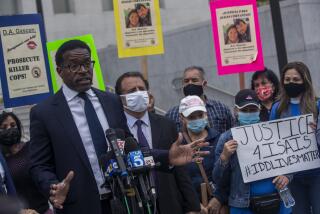Hiding behind their lawyers
Gloria Molina is right, at least in part. She and her colleagues on the Los Angeles County Board of Supervisors need to know what county employees are up to, because when those workers make serious mistakes, it’s the board that has to pay for them — to the tune of $89 million in legal judgments and settlements in 2012 alone. And that figure actually represents a plunge from prior years. The number is now expected to skyrocket as the county faces a growing number of excessive-force lawsuits brought against L.A. County sheriff’s deputies in jail inmate abuse cases.
Consider the case of Anthony Forlano, a sheriff’s deputy who in September was involved in the shooting death of a 23-year-old man near City Terrace. Forlano and a partner responded to a call in East Los Angeles, met with a witness who reported seeing a man with a gun, conducted a search and encountered a suspect. The deputies and the suspect fought, and Carlos Ernesto Oliva Sola was shot to death.
It was Forlano’s seventh shooting — an astounding number even across an 18-year career. Forlano had just come back to patrol after two years of desk duty, where he had been placed after an earlier shooting.
Many deputies, perhaps most, serve their entire careers without firing a shot. So what was the deal with Forlano? Was he just unlucky? Is he an exceptionally good deputy who draws the toughest assignments and is therefore more likely to be involved in dangerous confrontations? Or is he a problem officer, too likely to respond to situations with gunfire?
And why did the sheriff put him back on patrol?
Molina has good reason to want answers to these questions, because the Board of Supervisors has to pay to defend Forlano against lawsuits (or to settle the case). And if the county loses the suit, it must pay for any damages that a jury rules he caused. It must pay for the district attorney to investigate him to determine whether his actions constituted a crime. And if there was a crime, the county must pay to prosecute him. And of course when the county pays, it is with money collected from county residents, so it is actually all of us who are paying.
It’s the essence of a county supervisor’s job to protect the public treasury with protocols and procedures to ensure that all county departments monitor, discipline, correct and if necessary replace workers who repeatedly cost county residents
money or, worse, place them in mortal danger.
How can they do that — how can they identify problems and patterns and otherwise properly perform their oversight duties as required by law when the lawyer for the sheriff or the lawyer for the district attorney (who also happens to be their lawyer) withholds information?
To Molina, county lawyers are the problem. Last week she blasted County Counsel John Krattli for saying “no” to her request to see a Sheriff’s Department report on the incident. A motion before the board Tuesday calls on the sheriff to hand over his file on the shooting so that Molina and the rest of the board can review it behind closed doors.
“I have never had as much frustration as I’ve had with my own set of lawyers,” Molina said, “who cannot seem to understand who the client is.”
And we’re with Molina — to a point. She is correct that the county counsel prevents too much information from coming to people who need it to do their jobs. That’s in part because he must obey canons of legal ethics requiring him to protect the interests of his client — which is not simply the Board of Supervisors.
Like all municipal lawyers, the county counsel’s position is curious. His client is the county, a governmental entity consisting of elected officials such as the sheriff and the district attorney as well as the Board of Supervisors; thousands of workers; and in the case of Los Angeles County, 10 million constituents. With so many people who claim to be the client, and with so many competing legal interests to balance, the county’s lawyer can take on enormous power. He sometimes seems to be on both sides of the attorney-client privilege, directing the supervisors’ actions instead of taking directions.
But the supervisors have rarely hesitated to make that awkward relationship work in their favor. They frequently withhold information from the public or meet behind closed doors, then seek to excuse their actions by hiding behind legal advice that they are perfectly free to reject. The county counsel is their tool at least as often as he is their obstacle.
When it comes to obtaining confidential reports on the actions of sheriff’s deputies, members of the Board of Supervisors may have their hands tied by the Peace Officers’ Bill of Rights, a state law that, in the name of privacy, keeps far too much information about deputies’ use of force out of the hands not just of the supervisors but of the public. If the supervisors wanted to, they could put their not inconsiderable clout behind a legislative measure to modify that law.
We understand why Molina is seeking more data on the Forlano case at Tuesday’s meeting. But the more pertinent questions may be for those candidates seeking to succeed Molina, and also Supervisor Zev Yaroslavsky, both of whom are termed out this year. Will they continue the practice of hiding behind the attorney-client privilege to protect themselves from public scrutiny? Or will they recognize that their first duty is to share information about county wrongdoing?
More to Read
A cure for the common opinion
Get thought-provoking perspectives with our weekly newsletter.
You may occasionally receive promotional content from the Los Angeles Times.






